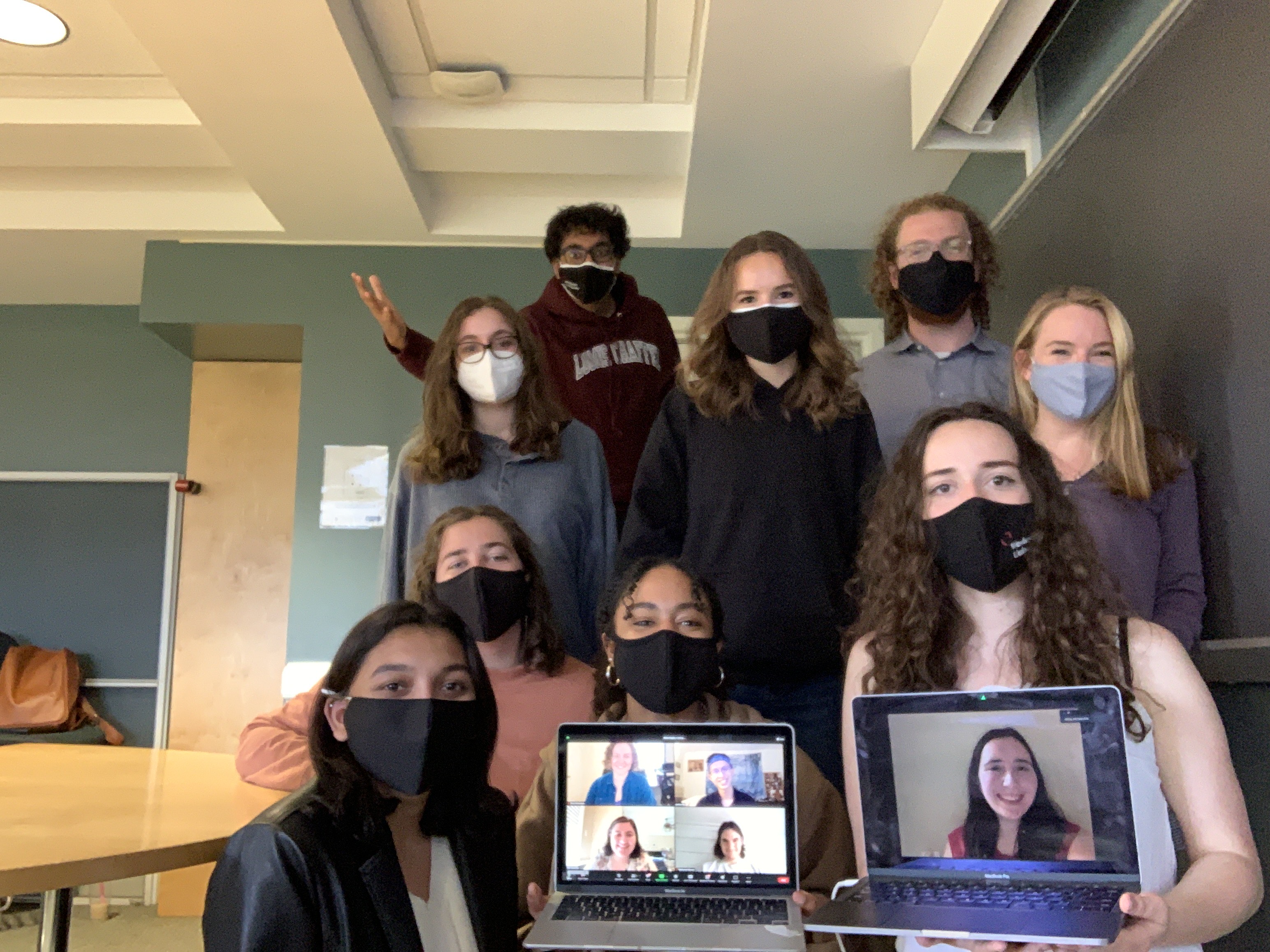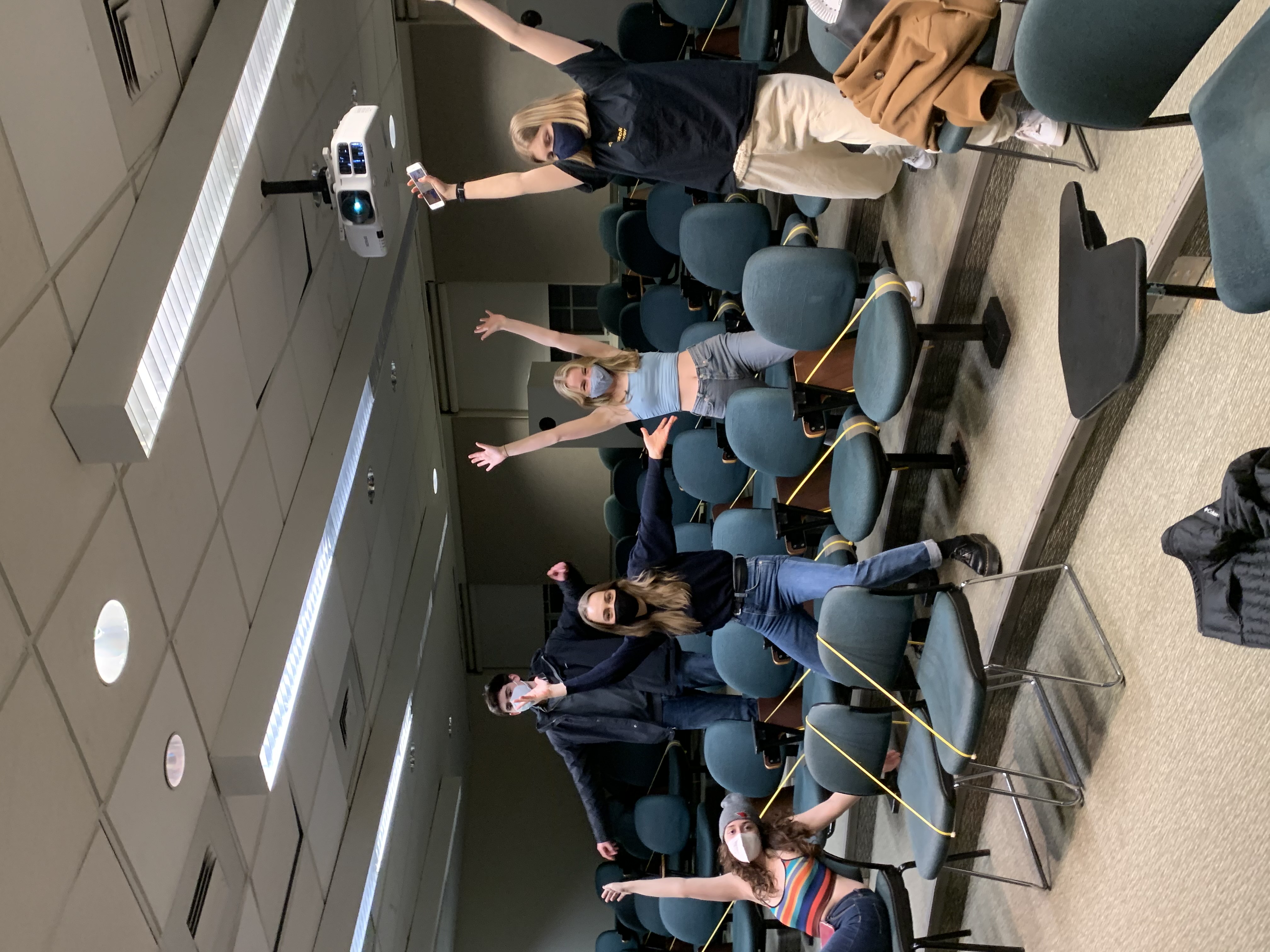
c/o Virginia Scolino
Many things were put on hold this year due to COVID-19, but it would take much more than a pandemic to keep Wesleyan Mock Trial out of their beloved fake courtroom. Just as real court cases moved online, collegiate mock trial continued competing this year over Zoom.
In April 2021, the mock trial season came to an end, and Wesleyan Mock Trial placed fifth in their division at the American Mock Trial National Championship Tournament, setting a new program record. The tournament was held virtually on April 16-18 with 48 teams competing from various universities. Though WesMock landed in 5th place, they tied the 2nd, 3rd, and 4th place teams in the tournament. In mock trial, ties are broken based on competitor scores, values which reflect how challenging a team’s opponents were. In addition to this team record, Anushka Somani ’24 also won an All-American Witness Award for playing the expert witness on defense.
Competing over Zoom brings new considerations and challenges, including keeping the judge’s attention despite many possible distractions. However, the team was able to adapt, from perfecting their backdrops to adjusting the way they presented evidence.
“We bought so many ring lights, oh my god. Everyone had a ring light or some kind of lighting situation,” Jillian Pincus ’22 explained. “I know Virginia [Sciolino ’21] and I were doing this thing where we put our chairs up on our desks so that we could put our computers on top of that so it would look good.”
The team also embraced the online format and found stronger ways to present their evidence.
“Normally, we would bring posters [to make our case], or we’ve had things where people blow up balloons during a round as a demonstration of like lungs, but on Zoom stuff like that doesn’t really work as well, so I made a bunch of PowerPoint presentations that had animations which is something you would never be able to do in a courtroom,” Alex Seys ’23 said. “It was interesting because you can share your screen with something that’s way more complicated than whatever you would in person. I’m gonna miss that a little bit.”
Zoom also changed the way the team practiced, turning what used to be entire afternoons-to-late nights spent in PAC socializing and rehearsing into focused meetings. They worked to find a new balance though, and still prioritized bonding.
“We might be on Zoom and it might feel super official, but you can still have fun,” Lincoln Alkind ’22 emphasized.
New mock trial member Alicia Paglia ’24 agreed that even over Zoom, the team was able to form strong bonds and make the most of their time together.
“From what I’ve heard, there was a lot more bonding in past years, but my experience this year has been really great,” Paglia said. “Mock trial has pretty much kept me alive through this year and given me people to hang out with and a great support system. Bonding wise, we’ve done game nights, and it was really nice competing in PAC with everyone and getting to chat with people.”
Zoom also gave the team the ability to scrimmage other schools they could not otherwise visit, growing their circle of competitors and learning about mock trial in different regions of the country.
“We would just hop on a zoom and we’d be able to do scrimmages with UVA [the University of Virginia], who we don’t really get to scrimmage because they’re pretty far away, and [we got to] do that more frequently and get to interact with other programs and see their styles and learn from them,” Pincus said.
In addition to the new skills the team gained, there were smaller perks associated with the virtual format.
“There’s so much to be said about not having to wear a full suit and everything,” Shlok Sharma ’23 said.
Seys agreed, admitting that he does not even know where his pre-pandemic mock trial wardrobe is.
“I lost my suit pants before this year, and then we went on Zoom and I’ve never had to wear them, so that was a huge crisis that just got absolutely avoided,” Seys laughed.
However, just as in a normal season, the mock trial team still faced a demanding schedule and other challenges that come with competition. Whether they were faced with stacking decisions—determining who is put on each team—rewriting their directs or trying to manage their mock trial responsibilities on top of being a student, the group dedicated a lot of time to their activity.
“It was described to me by someone who graduated that, with the Wesleyan ‘rule of seven,’ Mock Trial is going to count for two or three because of how much time it’s going to take,” Pincus said.

c/o Virginia Scolino
Some members even calculated the hours, adding that there is a lot to be done outside of the scheduled daily three-hour meetings to prepare for a tournament.
“From Friday, the previous week, until Thursday, the week the nationals began, we had 20 hours of scheduled meetings,” Seys said. “On top of that, I know that I at least met with Shlok for many more hours than that to run other content and I met with coaches to discuss my speeches.”
On top of the time spent preparing, members of the team were often shifted between teams and asked to take on new roles. Even at nationals, members were trying out roles for the first time.
“Competition-wise this semester, we had a ton of turnaround between every level of competition,” Alkind said. “Huge changes were being made and people were having to adapt really quickly to doing new parts and being on new teams. Our nationals team was a completely new team. This group of people had not all been on a team together before, and we had a brand new case and we came in fifth.”
While only 10 members competed in nationals, the Wesleyan Mock Trial is made up of 24 students, all of whom played an important role in the program’s success this year. They offered feedback before the competition and moral support.
“The team is so much greater than the 10 people that were able to be there,” Sciolino said. “It was a joy to be on this team and compete with these people, but to some extent it’s arbitrary. It’s just so meaningful to have a team where even the people that aren’t technically competing still want to help and be part of it and to have an impact, and I really do feel like they did.”
During the season, members are divided up into A, B, C, and D teams, and the national team included members from each of these groups.
“Our team is a very deep team,” Betsy Froiland ’22 said. “I genuinely think that you could pick any 10 people out of the whole program and you’d have a national team.”
Though WesMock adapted well to Zoom, they are hopeful to return to the in-person competition next year, remarking that they miss the fun of the road trips to other universities and making jokes with their competitors in between rounds.
“We don’t know really right now what next year will look like,” Alkind said. “We don’t know if it will be mostly in person, mostly online, or if we’ll be traveling. But I think that we’re in such an amazing place, no matter what happens, because we’ve been getting more and more creative with the Zoom format. So, if it’s Zoom again next year we know that we’re going to crush it and we’re going to keep getting better with that.”
Olivia Luppino can be reached at oluppino@wesleyan.edu